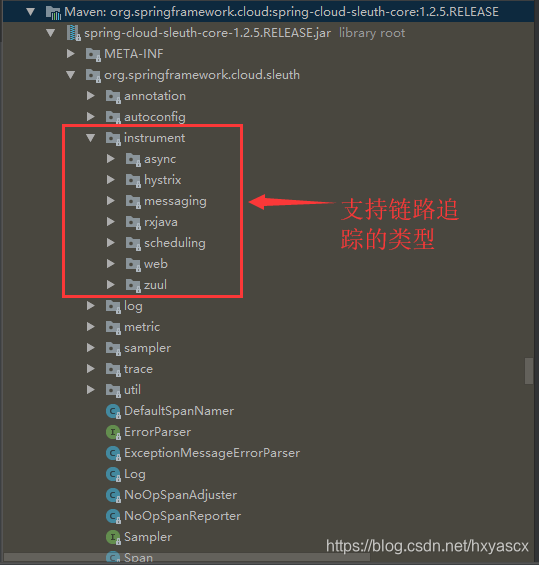为什么需要Spring Cloud Sleuth
微服务架构是一个分布式架构,它按业务划分服务单元,一个分布式系统往往有很多个服务单元。由于服务单元数量众多,业务的复杂性,如果出现了错误和异常,很难去定位。主要体现在,一个请求可能需要调用很多个服务,而内部服务的调用复杂性,决定了问题难以定位。所以微服务架构中,必须实现分布式链路追踪,去跟进一个请求到底有哪些服务参与,参与的顺序又是怎样的,从而达到每个请求的步骤清晰可见,出了问题,很快定位。
Spring Cloud Sleuth 主要功能就是在分布式系统中提供追踪解决方案,你只需要在pom文件中引入相应的依赖即可。
术语
spring cloud sleuth沿用Google的Dapper的术语:
- trace: 是由众多span组成的树形结构,使用64位标识生成唯一调度ID。
- span: 基本工作单元,例如,在一个新建的span中发送一个RPC等同于发送一个回应请求给RPC,span通过一个64位ID唯一标识,trace以另一个64位ID表示,span还有其他数据信息,比如摘要、时间戳事件、关键值注释(tags)、span的ID、以及进度ID(通常是IP地址)
span在不断的启动和停止,同时记录了时间信息,当你创建了一个span,你必须在未来的某个时刻停止它。 - Annotation: 用来及时记录一个事件的存在,一些核心annotations用来定义一个请求的开始和结束:
- cs: Client Sent -客户端发起一个请求,这个annotation描述了这个span的开始。
- sr: Server Received -服务端获得请求并准备开始处理它,如果将其sr减去cs时间戳便可得到网络延迟。
- ss: Server Sent -注解表明请求处理的完成(当请求返回客户端),如果ss减去sr时间戳便可得到服务端需要的处理请求时间。
- cr: Client Received -表明span的结束,客户端成功接收到服务端的回复,如果cr减去cs时间戳便可得到客户端从服务端获取回复的所有所需时间。

源码解析
spring-cloud-sleuth-core 结构:
- 可以看到源码中支持的追踪类型有很多,支持async,hystrix,websocket,rxjava,Spring mvc,servlet,spring restTemplate,feign,zuul等等,这里我着重探讨spring web mvc的链路追踪。
- 打开web包,找到TraceWebServletAutoConfiguration,这里配置了主要的初始化类。

过滤器注册
当启动初始化程序时,跟踪TraceWebServletAutoConfiguration代码如下
@Bean
public FilterRegistrationBean traceWebFilter(TracingFilter tracingFilter) {
FilterRegistrationBean filterRegistrationBean = new FilterRegistrationBean(tracingFilter, new ServletRegistrationBean[0]);
filterRegistrationBean.setDispatcherTypes(DispatcherType.ASYNC, new DispatcherType[]{DispatcherType.ERROR, DispatcherType.FORWARD, DispatcherType.INCLUDE, DispatcherType.REQUEST});
filterRegistrationBean.setOrder(-2147483643);
return filterRegistrationBean;
}
@Bean
@ConditionalOnMissingBean
public TracingFilter tracingFilter(HttpTracing tracing) {
return (TracingFilter)TracingFilter.create(tracing);
}
拦截器注册
然后看TraceWebMvcConfigurer类,它会进行拦截器的注册。
@Configuration
@Import({SpanCustomizingAsyncHandlerInterceptor.class})
class TraceWebMvcConfigurer implements WebMvcConfigurer {
@Autowired
ApplicationContext applicationContext;
TraceWebMvcConfigurer() {
}
public void addInterceptors(InterceptorRegistry registry) {
registry.addInterceptor((HandlerInterceptor)this.applicationContext.getBean(SpanCustomizingAsyncHandlerInterceptor.class));
}
}
在SpanCustomizingAsyncHandlerInterceptor类中,preHandle,afterCompletion方法使用Brave对请求进行拦截进行span的包装。Brave是Java版的Zipkin客户端,它将收集的跟踪信息,以Span的形式上报给Zipkin系统。
public final class SpanCustomizingAsyncHandlerInterceptor extends HandlerInterceptorAdapter {
@Autowired(
required = false
)
HandlerParser handlerParser = new HandlerParser();
SpanCustomizingAsyncHandlerInterceptor() {
}
public boolean preHandle(HttpServletRequest request, HttpServletResponse response, Object o) {
SpanCustomizer span = (SpanCustomizer)request.getAttribute(SpanCustomizer.class.getName());
if (span != null) {
this.handlerParser.preHandle(request, o, span);
}
return true;
}
public void afterCompletion(HttpServletRequest request, HttpServletResponse response, Object handler, Exception ex) {
SpanCustomizer span = (SpanCustomizer)request.getAttribute(SpanCustomizer.class.getName());
if (span != null) {
SpanCustomizingHandlerInterceptor.setHttpRouteAttribute(request);
}
}
}
zipkin端点提交
ZipkinAutoConfiguration会进行端点的提交。
public class ZipkinAutoConfiguration {
public ZipkinAutoConfiguration() {
}
@Bean
@ConditionalOnMissingBean
public Reporter<Span> reporter(ReporterMetrics reporterMetrics, ZipkinProperties zipkin, Sender sender, BytesEncoder<Span> spanBytesEncoder) {
return AsyncReporter.builder(sender).queuedMaxSpans(1000).messageTimeout((long)zipkin.getMessageTimeout(), TimeUnit.SECONDS).metrics(reporterMetrics).build(spanBytesEncoder);
}
@Bean
@ConditionalOnMissingBean
public BytesEncoder<Span> spanBytesEncoder(ZipkinProperties zipkinProperties) {
return zipkinProperties.getEncoder();
}
@Bean
@ConditionalOnMissingBean
public ZipkinRestTemplateCustomizer zipkinRestTemplateCustomizer(ZipkinProperties zipkinProperties) {
return new DefaultZipkinRestTemplateCustomizer(zipkinProperties);
}
@Bean
@ConditionalOnMissingBean
ReporterMetrics sleuthReporterMetrics() {
return new InMemoryReporterMetrics();
}
@Configuration
@ConditionalOnClass({Registration.class})
@ConditionalOnMissingBean({EndpointLocator.class})
@ConditionalOnProperty(
value = {"spring.zipkin.locator.discovery.enabled"},
havingValue = "true"
)
protected static class RegistrationEndpointLocatorConfiguration {
@Autowired(
required = false
)
private ServerProperties serverProperties;
@Autowired
private ZipkinProperties zipkinProperties;
@Autowired(
required = false
)
private InetUtils inetUtils;
@Autowired
private Environment environment;
@Autowired(
required = false
)
private Registration registration;
protected RegistrationEndpointLocatorConfiguration() {
}
@Bean
public EndpointLocator zipkinEndpointLocator() {
return new DefaultEndpointLocator(this.registration, this.serverProperties, this.environment, this.zipkinProperties, this.inetUtils);
}
}
@Configuration
@ConditionalOnMissingBean({EndpointLocator.class})
@ConditionalOnProperty(
value = {"spring.zipkin.locator.discovery.enabled"},
havingValue = "false",
matchIfMissing = true
)
protected static class DefaultEndpointLocatorConfiguration {
@Autowired(
required = false
)
private ServerProperties serverProperties;
@Autowired
private ZipkinProperties zipkinProperties;
@Autowired(
required = false
)
private InetUtils inetUtils;
@Autowired
private Environment environment;
protected DefaultEndpointLocatorConfiguration() {
}
@Bean
public EndpointLocator zipkinEndpointLocator() {
return new DefaultEndpointLocator((Registration)null, this.serverProperties, this.environment, this.zipkinProperties, this.inetUtils);
}
}
@Configuration
@ConditionalOnMissingClass({"org.springframework.cloud.context.config.annotation.RefreshScope"})
protected static class NonRefreshScopeProbabilityBasedSamplerConfiguration {
protected NonRefreshScopeProbabilityBasedSamplerConfiguration() {
}
@Bean
@ConditionalOnMissingBean
public Sampler defaultTraceSampler(SamplerProperties config) {
return new ProbabilityBasedSampler(config);
}
}
@Configuration
@ConditionalOnClass({RefreshScope.class})
protected static class RefreshScopedProbabilityBasedSamplerConfiguration {
protected RefreshScopedProbabilityBasedSamplerConfiguration() {
}
@Bean
@RefreshScope
@ConditionalOnMissingBean
public Sampler defaultTraceSampler(SamplerProperties config) {
return new ProbabilityBasedSampler(config);
}
}
}
reporter: 内部会初始化sender以及delegate。sender是以何种方式将zipkin span发送到zipkin server。delegate是一个委托类,内部创建一个有界队列,异步将zipkin span发送到zipkin server。
zipkinRestTemplateCustomizer: 创建reporter bean时需要依赖的sender。这里zipkin使用restTemplate作为sender提交span。
调用http接口时,进入过滤器
进入TraceWebFilter中的过滤方法filter
public Mono<Void> filter(ServerWebExchange exchange, WebFilterChain chain) {
if (this.tracer().currentSpan() != null) {
this.tracer().withSpanInScope((Span)null);
}
String uri = exchange.getRequest().getPath().pathWithinApplication().value();
if (log.isDebugEnabled()) {
log.debug("Received a request to uri [" + uri + "]");
}
Span spanFromAttribute = this.getSpanFromAttribute(exchange);
String CONTEXT_ERROR = "sleuth.webfilter.context.error";
return chain.filter(exchange).compose((f) -> {
return f.then(Mono.subscriberContext()).onErrorResume((t) -> {
return Mono.subscriberContext().map((c) -> {
return c.put("sleuth.webfilter.context.error", t);
});
}).flatMap((c) -> {
Span span = this.spanFromContext(c);
Throwable t = null;
Mono continuation;
if (c.hasKey("sleuth.webfilter.context.error")) {
t = (Throwable)c.get("sleuth.webfilter.context.error");
continuation = Mono.error(t);
} else {
continuation = Mono.empty();
}
String httpRoute = null;
Object attribute = exchange.getAttribute(HandlerMapping.BEST_MATCHING_HANDLER_ATTRIBUTE);
if (attribute instanceof HandlerMethod) {
HandlerMethod handlerMethod = (HandlerMethod)attribute;
this.addClassMethodTag(handlerMethod, span);
this.addClassNameTag(handlerMethod, span);
Object pattern = exchange.getAttribute(HandlerMapping.BEST_MATCHING_PATTERN_ATTRIBUTE);
httpRoute = pattern != null ? pattern.toString() : "";
}
this.addResponseTagsForSpanWithoutParent(exchange, exchange.getResponse(), span);
TraceWebFilter.DecoratedServerHttpResponse delegate = new TraceWebFilter.DecoratedServerHttpResponse(exchange.getResponse(), exchange.getRequest().getMethodValue(), httpRoute);
this.handler().handleSend(delegate, t, span);
if (log.isDebugEnabled()) {
log.debug("Handled send of " + span);
}
return continuation;
}).subscriberContext((c) -> {
Span span;
if (c.hasKey(Span.class)) {
Span parent = (Span)c.get(Span.class);
span = this.tracer().nextSpan(TraceContextOrSamplingFlags.create(parent.context())).start();
if (log.isDebugEnabled()) {
log.debug("Found span in reactor context" + span);
}
} else {
if (spanFromAttribute != null) {
span = spanFromAttribute;
if (log.isDebugEnabled()) {
log.debug("Found span in attribute " + spanFromAttribute);
}
} else {
span = this.handler().handleReceive(this.extractor(), exchange.getRequest().getHeaders(), exchange.getRequest());
if (log.isDebugEnabled()) {
log.debug("Handled receive of span " + span);
}
}
exchange.getAttributes().put(TRACE_REQUEST_ATTR, span);
}
return c.put(Span.class, span);
});
});
}
来源:CSDN
作者:微笑看你哭
链接:https://blog.csdn.net/hxyascx/article/details/103969286
